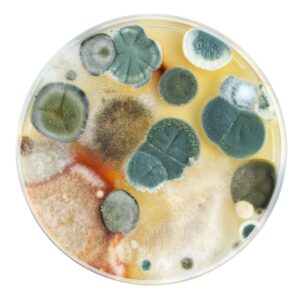June 09, 2023 | Black & Kletz Allergy

Molds are fungi that grow in the form of multicellular strands called hyphae. Fungi that circulate in a single celled environment are called yeasts. Molds are a common cause of hay fever (allergic rhinitis) and/or eye allergies (allergic conjunctivitis). Individuals that are allergic to molds may experience sneezing, nasal congestion, runny nose, post-nasal drip, itchy nose, sinus headaches, itchy eyes, watery eyes, and/or redness of the eyes. In some people, molds may cause asthma-like symptoms which may include wheezing, chest tightness, coughing, and/or shortness of breath. In asthmatics, molds may be a triggering factor which can cause a worsening of their asthma symptoms. The treatment of allergic rhinitis, allergic conjunctivitis, or asthma due to mold allergies usually involves reducing the exposure to molds, if possible. Common medications that are used may include antihistamines, decongestants, mast cell stabilizers, topical corticosteroids, anticholinergics, inhaled beta-agonists, leukotriene antagonists, and occasionally biological medications. Allergy immunotherapy (i.e., allergy shots, allergy injections, allergy desensitization) is very effective in the treatment of mold allergies as it helps in 80-85% of patients on the injections. The average length of time on allergy immunotherapy is typically 3-5 years.
Not only can molds not cause allergy symptoms, but molds can in fact affect individuals in 3 other major ways: 1. Act as an irritant; 2. Cause infection; or 3. Act as a toxin.
Molds can cause an irritant reaction which is similar to an allergic reaction but this type of reaction is not technically allergic since there is not an immune reaction to the molds. Irritant reactions are also called nonallergic rhinitis. Individuals that have an irritant response to molds typically experience symptoms such as irritated eyes, nose, throats and/or lungs. Examples of irritant reactions include a runny nose after eating horseradish or burning and watery eyes from freshly cut onions. The best treatment of irritant reactions to molds is to avoid exposure to molds. If one cannot avoid exposure, medications may be used to help minimize the symptoms of the irritant reaction. Such medications may include oral antihistamines, oral decongestants, nasal antihistamines, nasal decongestants, nasal corticosteroids, nasal anticholinergics, and/or ocular medications.
Fungi and molds can cause infections in certain individuals, particularly those who are immunocompromised or have a “low” immunity. Individuals can be immunocompromised for a variety of reasons which may include medications (e.g., corticosteroids, tacrolimus, cyclosporine, biological monoclonal antibodies, azathioprine), immunodeficiencies (e.g., hypogammaglobulinemia, Bruton’s agammaglobulinemia, IgG subclass deficiency, common variable immunodeficiency), HIV/AIDS, elderly individuals, radiation, cancer, malnutrition, and stress after surgery, to name a few. Fungi tend to infect the sinuses, brain, eyes, lungs, nails, esophagus, tongue, and/or bloodstream. The fungal infection can be either systemic or superficial. Systemic fungal infections tend to occur more in immunosuppressed individuals and may be life-threatening. It is important to note that superficial fungal infections of the nails, tongue, and skin are common in normal individuals without compromised immune systems. Fungal infections of the lungs, brain, bloodstream, esophagus, sinuses, and eyes that are more problematic and tend to occur more often in patients with compromised immune systems. The treatment of fungal infections varies depending on the severity and location of the fungus. It should be noted that antifungal medications are used to treat fungal infections and may be given orally, topically or intravenously.
Molds may also act as a toxin in a condition called toxic mold syndrome. This syndrome is caused by mycotoxins (i.e., toxins produced by molds) and is sometimes referred to as sick building syndrome. Individuals with this disorder generally complain of a variety of non-specific symptoms as the symptoms may vary greatly from one individual to another. The symptoms may include watery eyes, itchy eyes, red eyes, runny nose, sore throat, rashes, headaches, nosebleeds, nausea, vomiting, dizziness, anxiety, fatigue, lack of concentration, mood swings, poor appetite, insomnia, weight loss, memory loss, hair loss, rashes, chest tightness, coughing, wheezing, and/or shortness of breath. Toxic molds grow most commonly on damp walls and ceilings. Toxic molds tend to manifest as black, brown, or green patches along with an associated musty odor.
The board certified allergists at Black & Kletz Allergy have expertise in diagnosing and treating mold allergies, as well as all types of other allergic conditions and asthma. We are board certified to treat both pediatric and adult patients and have been doing so in the Washington, DC, Northern Virginia, and Maryland metropolitan area for more than 50 years. Black & Kletz Allergy has offices in Washington, DC, McLean, VA (Tysons Corner, VA), and Manassas, VA. All 3 of our offices have on-site parking. For further convenience, our Washington, DC and McLean, VA offices are Metro accessible. Our McLean office location offers a complementary shuttle that runs between our office and the Spring Hill metro station on the silver line. For an appointment, please call our office or alternatively, you can click Request an Appointment and we will respond within 24 hours by the next business day. If you suffer from mold allergies, we are here to help alleviate or hopefully end these undesirable symptoms so that you can enjoy a better quality of life. Black & Kletz Allergy is devoted to providing the highest quality allergy care in a caring, relaxed, and professional environment.












